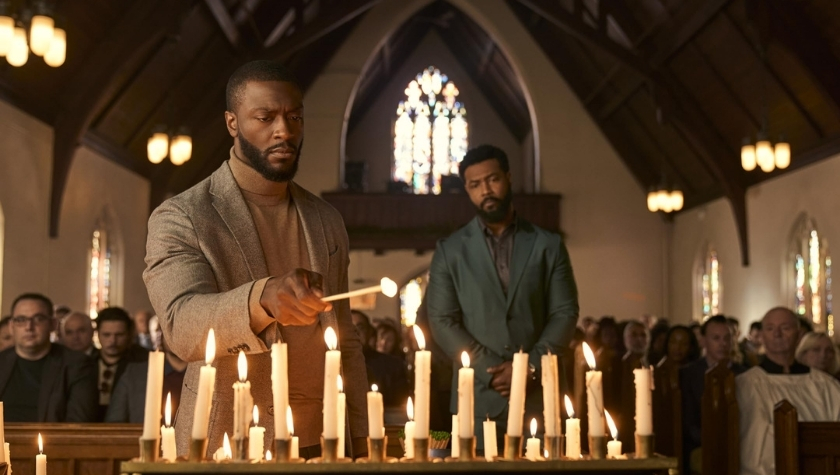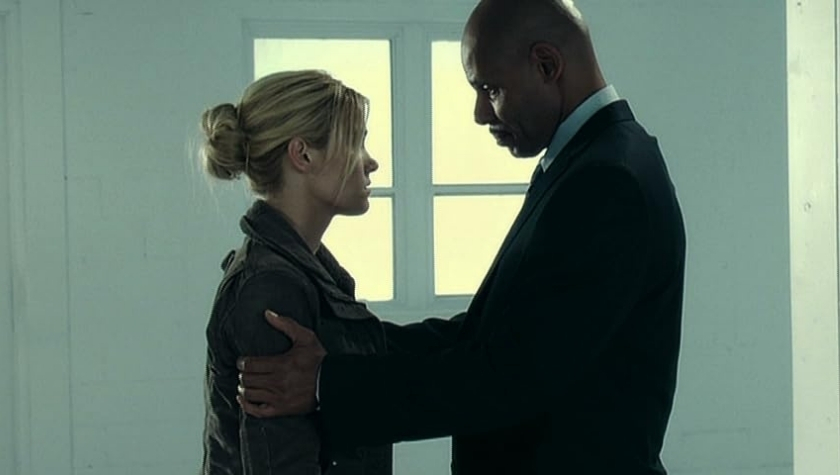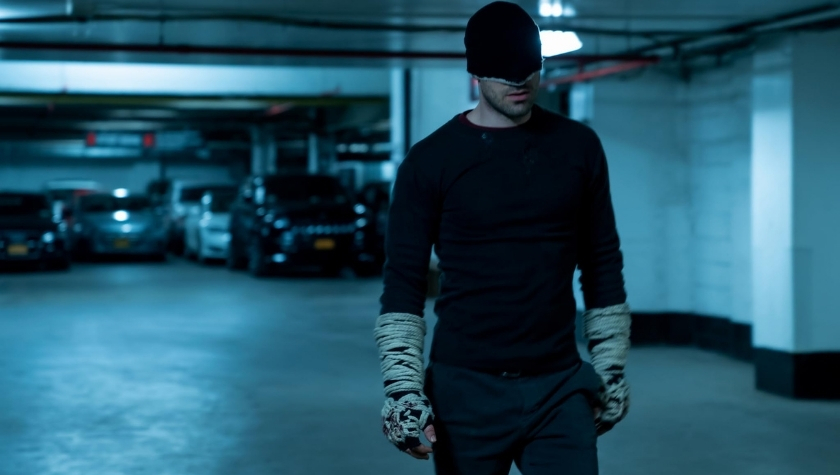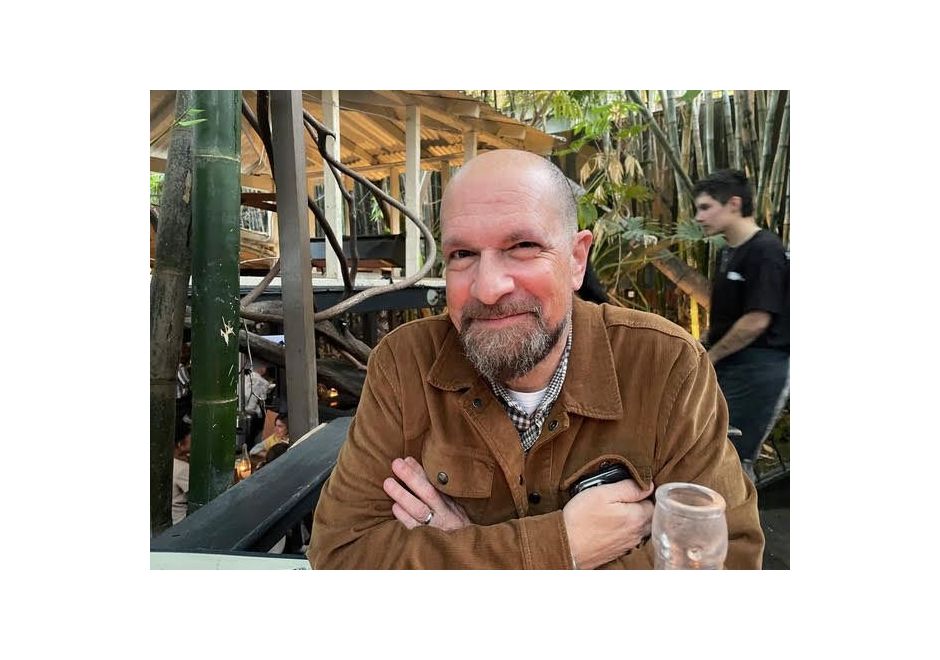Writer Liz Thompson talks to prolific TV writer/producer/showrunner Sam Ernst, whose work you may know from such TV shows as Cross, Daredevil, Carnival Row, Haven, Hand of God, Truth Be Told.
This is such a wild interview for me, because way back in 2019, I took a class from you that was pivotal in me writing a sample that got me most of my first generals, including one that got one of my shows into development.
Wow, great, I'm so glad to hear that.
Is there anything that you bring to teaching that overlaps with how you showrun and anything that's very different?
What I teach in my classes is really what I try to do myself. The thing that I always say to my students is “in this group of ten or so of us, I'm probably not the most talented writer. I’m just the one that probably has accumulated the most amount of writing craft knowledge.” The craft I teach is what works best for me. Not just in theory, but the craft I go to every single day when I'm in the room, or I'm working on the page, either way. Some of the stuff I teach is really easy to understand and elemental, but just because you know the rule, or the strategy, to approach a story doesn't mean you can make it work, so it takes time for it to sink in. But there’s really a small set of skills to learn, and everyone uses that small set in infinite variation.
Have you ever had a moment in the Cross room where you guys were working on something and you're like, “Hey, we’re missing a turn?”
It happens all the time. I don't say “We're missing a turn” out loud to the room. But I'll ask certain kinds of questions to the room. A lot of the time, I'm saying it to my writing pad that I'm working on. And I'll say, “Why is this driving me crazy?” And it's not that there isn't a turn in the scene, although that could be true. It's that the turn in the scene is not really telling me anything about the character. I think most working writers can create a turn in a minute. But that doesn't make it a great turn, it just makes it a functional turn. And I think we're always shooting for more than that. If I can get a turn, plus it really reveals something, since action reveals character, that’s phenomenal.


Speaking of turns and moments that mean something, I’m really amazed at how well the writers of Cross create characters — down to even the smaller roles, making us care about someone who might just pop up for one episode. You don’t see that a lot.
That has everything to do with Ben Watkins, the creator of the show. He really hates cardboard cutout tertiary characters. Even if there's a character that's not going to be around long, he's not happy for them to have vanilla lines or a vanilla identity. And it can be frustrating sometimes when we don't really need that character to do much. But it doesn't take a lot to add dimension to a character. To make them real. It may seem hard, but you don't have to figure out the name of their third-grade teacher. You're just writing what normal people would say, and how they would react in that situation.
I've heard some writers say that if you have a really good line, you need to give it to the lead actor. But in Cross it feels like everyone is written so well that there is room for even the smaller roles to be elevated, and you can feel that. I think the opening scene, that interrogation with Cross’s monologue. That is when I thought, “Oh, this is new…” I think I emailed you right when I watched it, because that scene is one of the best written scenes I've seen in a very long time.
That's a combo platter of Ben Watkins and Aldis Hodge. It's 100% those two; Ben wrote it and then Aldis just took it and made it his own. And when that happens, if you turn the camera around, you could just see a bunch of writers and producers sitting there and just smiling. I think in that scene, it was more than smiling for me. I was actually getting a little choked up, because Ben had written the pilot a couple years before that, and to see it actually make it to this place and get to see Aldis take it and just run with it was amazing.
It feels like it's that kismet of the right role and the right person on the right show.
It is. It’s part of why I love Cross. It's one of my favorite shows I’ve ever worked on.
Do we know if it has a season three yet?
We haven't heard yet. But the second season is done.
Are you developing in between seasons?
Always. I don't feel like there's ever a time where I cannot develop. First of all, I have to, the damn ideas just appear and have to be dealt with. Usually they come while I'm on date night with my wife, and she's noticing that I haven't heard the last thing she said, and then I'm in trouble. I try to use the same excuse, which is, “I know I'm spacing out but this does, you know, pay the rent, et cetera, et cetera,” and then I apologize profusely, and then secretly run off to the bathroom so I can write it down as fast as possible.


Do you have any writing traditions, habits, favorite places to work apart from restaurant bathrooms?
Not really, no. Jim Dunn, my writing partner, and I move around. Sometimes his house, sometimes my house, sometimes we go to coffee shops. We've written in the Getty Museum, we go down to Huntington Gardens, just trying to change things up. Jim sits there like Yoda, I pace and walk around all over the place. That's the way we operate.
It’s funny because my wife and daughters have had to learn to respect this process, but Jim and I will bullshit for a while as we warm up. Jim and I were freshman year roommates in college, so we've known each other more than half our lives. We can call back to things that happened 25 years ago, or two and a half years ago. So we bullshit for a certain amount of time, and then we both kind of sense it’s time to work without saying anything. And then we do, and we hit it pretty hard. We really don't waste the day, because we want to get a lot done. But if my wife or daughters would come in for a while, it seemed like they were always coming in at the bullshitting part, and they would miss the real grinding part. But now they know it’s part of the process.
Do you have a life motto of any kind?
I was talking with my daughter this morning about the genius of Nike’s “Just do it,” and how you could interpret that in so many different ways and apply it to so many different situations, which is why it's never changed in all the decades since they came up with it. That comes along with “Just write the damn script,” or “Don't focus on what's not working. Just keeping doing it. Keep asking the questions.” But for me, my latest writing/life motto would be “Stop making sense.”
Oh, that's good.
I was watching this documentary on Alfred Hitchcock. And his quote that I had to stop and pause for — I texted this quote to Jim, because he was annoying me with some logic thing — Hitchcock said, "Logic is the enemy of creativity.” And that's so true. It’s not that things don't have to make sense. They do. But if we’re in the writer's room, and I have a terrible idea, and someone said, “Well, that doesn't make any sense.” I would get frustrated. I’d probably say, "I'm not trying to making sense yet.” A writer I worked with, Rich Hatem, had a great line, which was “Let it suck.” In other words, let this idea be terrible for a minute. There's something interesting in there. I know it doesn’t make sense yet. And I'll say to Jim all the time, "This doesn't make any sense." Or “I don't even know what I'm talking about.” 'Cause I genuinely don't in that moment. But I'm gonna say this, and I'm hoping that the person that's writing with me will either be inspired and find something, or will help me find what I'm searching for. Either one of those is a great outcome. So, yeah, stop making sense.
It’s a great reminder. It’s fascinating how much we can subconsciously limit how far our brains will go with an idea because of an unspoken impulse to “Make it make sense.”
Yes, absolutely. And that happens in the room too. I'll hear a pitch and sometimes I'll think to myself, "Okay, definitely makes sense, but I don't care." I'm not excited. It’s just something that makes sense. And hopefully we're shooting for something a little higher than that. I’ll ask myself, “What can really funk this up a little bit?”
If you had to do a cross-country road trip with a fictional character that you've written for before, who would you pick and why?
Oof. That’s a good one. One of the coolest characters would have to be Matt Murdoch, from Daredevil. He's a really interesting character and Charlie Cox is a great actor and a very interesting person. So that would be one of them. I might be blending Charlie in there a little bit with Matt, but oh well. Also Vignette Stonemoss, she was a faerie in Carnival Row. She was a really interesting character, and she was really fun to write for. Also, Audrey Parker, from Haven. I named her after my daughter who was about two or three at the time. But now she’s about to be a senior in college, so it makes me think of those times, and that character was a lot of fun.


Is there anything that you can't live without?
I'm boring, but I'm going to say my MacBook. My MacBook and the Grateful Dead. Not necessarily in that order. Those two things and I can get a lot done. Some of it even useful.
Do you have a favorite thing that you've ever written?
I have favorite things that I've written, but I have more things that I love that I was just part of. There might be a scene where I don't know who actually wrote that scene, and even if it was me, everybody on a show contributes to the writing in so many different ways. Maybe a scene was conceived in the writer's room. Then it was written, and someone rewrote it, or someone gave some key notes. Maybe it was me, maybe somebody else. I have no idea. After a while, we tend to lose ownership of things that are made. I actually love that because it feels like we share ownership of the whole thing. We've written so many stories, and after a while, I can't remember a lot of them. Which is a gift. Because I just want to be there working on the next thing, coming up with the next great moment, or being there when other writers come up with it. That is where the fun is. That's the stuff I love. So it's not about, “Oh, I wrote this script and it's so wonderful.” That's kinda yesterday's news to me.
That’s such a great answer. Just a love of the process. Can you tell me about someone who was pivotal in your journey from being an amateur to becoming a professional writer?
Yeah, Scott Shepard was our first showrunner on Haven, and he taught me a lot. He had been a long time showrunner at that point, and he could sort out the background noise so fast, and identify what was important, and that takes a long time to learn. The way the showrunner job is designed, it's practically impossible for one person to do it well. It's not that they can't, but if they can, then they can't also have a life. Which tells me it's not a well-designed job. Jobs should be designed so that you can do your job and have some amount of life. Scott taught me how to eliminate the noise around some of it. He also taught me that if an episode is structured well right from the start, it can withstand the many changes that inevitably come.
Also, I heard John Wells speak recently, and he had the best advice. He talked about how sometimes you need to ignore an email. Because by the end of the day, it'll resolve itself, and you don't have to get into every discussion. Shows are not always better because you're in every conversation. You just have to know the ones you really need to be in. It’s all about balance.
Okay, last question. Who's a writer that you've never met, but you admire?
There's a lot of them. Ron Moore, the creator of Battlestar Galactica, wrote one of the greatest sci-fi shows ever. This is embarrassing, but Ron Moore was at a school event that I went to for my kid, and he was there for his kid. He was just another dad, and I was just a dad, and we were at this kid thing. I had just gotten Haven picked up, so I was like, "Oh, I should go talk to him, he has a show on SyFy too…” But I couldn’t do it. I was too intimidated. So, yeah, he's probably my guy.
I’ve sent fan letters to a few writers I admire, too. I never send them to someone that I’m trying to work with because I don't want them to feel like I’m writing with an agenda. But if I watch something I really love, that’s doing really cool things, it’s just very exciting to send out a letter. Because I know that when you’re in it, you mostly hear about what’s not quite working. And I just want them to know, from one writer to another, you nailed it and thank you.
It’s nice to know the nerves never really go away around our heroes!

